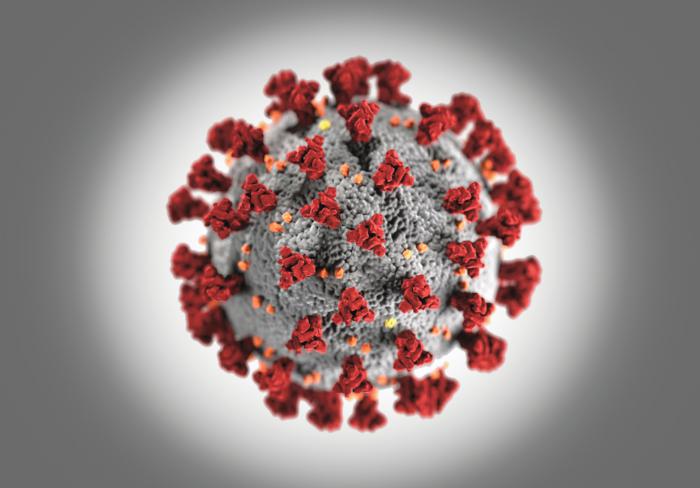Local
Don't panic, but prepare for coronavirus, says archdiocesan official
By Jacqueline Tetrault Pilot Staff
Posted: 3/13/2020


This illustration, created at the Centers for Disease Control and Prevention (CDC), reveals ultrastructural morphology exhibited by coronaviruses. Courtesy CDC.com
WATERTOWN -- "We should not be panicking," MC Sullivan, chief healthcare ethicist for the Archdiocese of Boston told Bishop Robert Reed in a CatholicTV special program, "Understanding the Coronavirus," that aired March 10 and can be viewed at CatholicTV.org.
"What we should be doing is using the time that we are having before this descends on us on a grand scale, to be careful, to be cautious, to learn the behaviors that will help to prevent or to lessen the impact of this illness," Sullivan said.
She explained that the COVID-19 virus, a type of coronavirus, is a respiratory disease spread through droplets. Unlike bacterial infections that can be cured with antibiotics, viruses have no cure, so their treatments are mainly for symptoms. The COVID-19 virus is a new virus, so there is no vaccine for it.
The good news, Sullivan said, is that the United States has had "lead time" to prepare for the spread of the virus, which originated in China and crossed through Asia and Europe before coming to the U.S.
"Its presence is still relatively low in our country, and we need to take advantage of this time and do everything we can to really minimize the impact that it will have on us," she said.
Sullivan said the spread of the disease is being studied in order to determine whether public education and quarantine methods are effective in preventing it.
"If there is something to be learned from it, coming later in the course of the worldwide spread, the U.S. ought to be able to benefit from it," she said.
Sullivan said the people most "at risk" are those with weakened immune systems. In light of this, she identified two groups that would be most endangered by the illness: elderly people and people whose immune systems are compromised by chronic illness or underlying health conditions.
The steps to prevent the spread of the disease, Sullivan said, are the ones also used to prevent the spread of colds and flus: washing hands, maintaining distance with other people, and using disposable tissues when coughing or sneezing. She said handwashing should take 20 seconds, about the amount of time needed to recite an "Our Father" and "Hail Mary," and that the friction helps just as much as soap and water.
To keep one's immune system "finely tuned," Sullivan advised getting a good amount of sleep, staying hydrated, and maintaining a healthy diet, with fruits and vegetables to supply vitamins.
She noted that the virus' symptoms can mimic those of a cold or light flu. This means many people may not recognize it for what it is, and simply take over-the-counter medication and carry on with their routines. Instead, Sullivan said, people with symptoms of a respiratory illness should stay home to avoid spreading it.
Responding to the question of when to contact a health professional, Sullivan advised calling a doctor before visiting one in person. She said those who are seriously ill -- for example, with a fever of over 100.4 degrees -- should contact a doctor. Someone experiencing shortness of breath should call 911.
Sullivan recommended stocking up on pump soap, paper towels, tissues, cold medications to treat symptoms, hand sanitizer, and disinfectant wipes to clean frequently used surfaces.
The archdiocese has said it is closely monitoring the coronavirus situation and has established a page on their website, BostonCatholic.org/coronavirus, with the latest updates and information.
Liturgical directives designed to prevent the spread of the virus were put into effect Feb. 29 and will remain effective "until determined otherwise" by Cardinal Seán P. O'Malley.
The directives call for suspending the distribution of the Precious Blood during the Mass and for worshipers to refrain from physical contact when exchanging the sign of peace. They also call for holy water fonts to be drained and cleaned regularly.
Also, in a March 6 email, Chancellor John Straub asked Pastoral Center employees to work from home for a period of 14 days if they or any member of their household have recently returned from a country with a CDC Geo Risk/Travel Restriction Level 2 or above related to COVID-19. As of March 11, those countries were China, Iran, Italy, South Korea (Level 3) and Japan (Level 2).
The chancellor also said those with symptoms consistent with COVID-19, regardless of travel, should stay home until their physician has determined that it is safe to return to work.
As of press time, the archdiocese has said that further guidance is forthcoming regarding school and youth travel, parish and social events, and the ministry of extraordinary ministers "with specific focus on nursing home ministry."
However, the archdiocese said it does not currently foresee cancelling Masses.